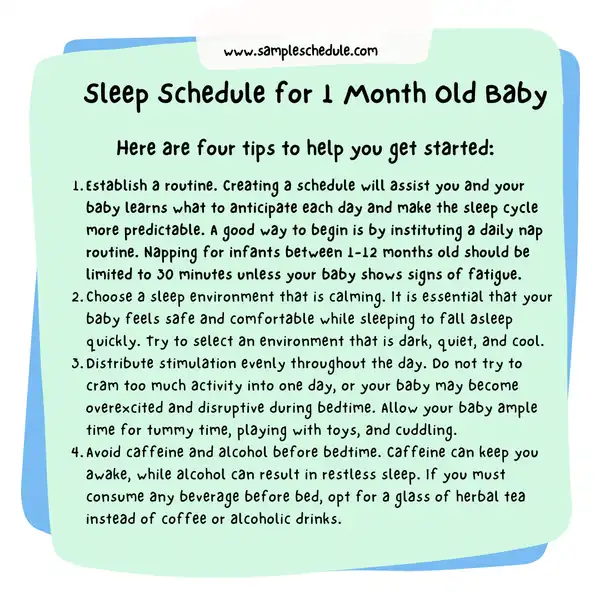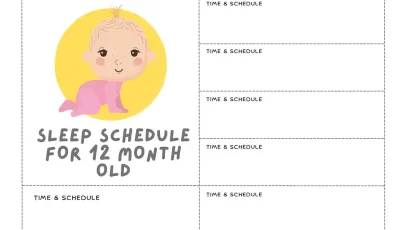Pinpointing a perfect sleep schedule for 1 month old baby can be daunting, but with the right tips, it can be done. Follow these guidelines, and you’ll be on your way to getting the sleep your babe needs to grow healthy and strong!
Tips for Getting a Perfect Sleep Schedule for 1 Month Old Baby
When setting a normal sleep schedule for 1 month old baby, it is necessary to start with the basics. Here are four tips to help you get started:
- Establish a routine. Creating a schedule will assist you and your baby learns what to anticipate each day and make the sleep cycle more predictable. A good way to begin is by instituting a daily nap routine. Napping for infants between 1-12 months old should be limited to 30 minutes unless your baby shows signs of fatigue.
- Choose a sleep environment that is calming. It is essential that your baby feels safe and comfortable while sleeping to fall asleep quickly. Try to select an environment that is dark, quiet, and cool.
- Distribute stimulation evenly throughout the day. Do not try to cram too much activity into one day, or your baby may become overexcited and disruptive during bedtime. Allow your baby ample time for tummy time, playing with toys, and cuddling.
- Avoid caffeine and alcohol before bedtime. Caffeine can keep you awake, while alcohol can result in restless sleep. If you must consume any beverage before bed, opt for a glass of herbal tea instead of coffee or alcoholic drinks.

Tips for Getting a Perfect Sleep Schedule for 1 Month Old Baby
How to create a sleep schedule for 1 month old baby
Obtaining a good night’s sleep schedule for 1 month old baby starts with setting a routine. Here are five tips for creating a sleep schedule for 1 month old to allow your baby to fall asleep quickly.
- Start by reading your baby a favorite book before bedtime.
- Create a calming environment by removing any potential noise or stimulation from the room.
- Avoid caffeine and alcohol before bedtime, as they can interfere with sleep.
- Establish a regular schedule for feeding and napping, and adhere to it as broadly as possible.
- Let your baby have time to adapt to new surroundings and situations, such as a new crib or sleeping in a different room, before imposing a stricter sleep routine.
Why a regular sleep schedule is important for your 1 month old baby
- A regular sleep schedule is essential for your sleep schedule 1 month old baby’s development.
- A proper sleep schedule is crucial for your 1-month-old’s mental and physical health.
- Establishing a regular sleep schedule is one of the most important things you can do for your baby.
- A regular sleep schedule will help to decrease the number of night wakings your baby experiences.
- Regular sleep schedules make it more comfortable for your baby to learn to fall asleep independently.
- A regular sleep schedule will decrease the risk of SIDS (Sudden Infant Death Syndrome).
Common sleep problems in sleep schedule for 1 month old baby and how to solve them
When it comes to sleep, there will always be some struggles. There are usually some easy solutions, whether your baby is struggling to get to sleep, stay asleep, or wake up multiple times a night. This section will discuss some of the more common sleep problems in 1-month-old babies and how to solve them.
- To start, let’s talk about newborn sleep. Newborns naturally require a lot of sleep. Their brains and bodies are still developing, and they need the rest. On average, newborns need around 12 hours of sleep per day. This can range slightly depending on the baby, but as a general rule of thumb, expect your little one to take about 11 hours of nap time and 7 hours of sleep at night.
- If your little one is consistently not sleeping through the night, you can do a few things to help. First of all, make sure your baby is getting enough rest. Try to stick to a regular sleep schedule and ensure you provide your baby with enough naps. If breastfeeding, ensure to latch onto the nipple fully and avoid grazing your baby’s stomach.
- If you’re struggling to get your baby to sleep at night, you can do a few different things. One common solution is to try a noise machine. Some babies love the sound of white noise, while others find it comforting. Another solution is to try different bedtimes. Some babies have best slept when they go down at around 7 pm, while others can handle going down at 6:30 pm or later. Finally, if your baby wakes up multiple times during the night, try withholding food from them for an hour before bedtime. This will help them get sleepy again quickly.
- If you’re still having trouble getting your baby to sleep through the night, don’t be afraid to seek advice from a doctor or Sleep Specialist. They may be able to prescribe medication or give you some other tips that work better for your baby’s case. Read Also : The Best Sleep Schedule for 12 Month Old
The best sleep position for your 1 month old baby
Here are a few things to consider when finding the best sleep position for your 1 month old baby. A regular sleep schedule is important for your baby, as is a comfortable sleep environment.
- The best sleep position for your 1-month-old baby is on their back. This is the most common sleep position for infants and is considered the safest. It puts your baby in a neutral position, which helps keep their spine healthy. It’s also ideal if they have reflux or GERD, as it helps reduce the risk of ensuring that they aspirate.
- The best sleep position for your 1-month-old baby is on their sides. The sidesaddle position is often recommended for infants younger than 12 months old because it allows them to move around and explore. Plus, it reduces the risk of respiratory infections. If your baby doesn’t seem to be getting enough oxygen while in this position, try propping them up with a pillow or blanket.
- If you’re breastfeeding, you may want to try tummy-down sleeping. This allows you and your baby to rest comfortably with their heads and chests supported by the mattress. Remember that babies’ stomachs sink further when slumbering, so they may require a higher sleep surface than other babies.
- Finally, if your baby loves being held, try placing them in a bassinet or crib with their head at the top. This allows you unrestricted access to soothe and comfort your baby while they sleep.
If you’re struggling to get your 1-month-old to settle down during the day, try establishing a regular sleep schedule and basing bedtime off that schedule. Follow these tips to help create a relaxing bedtime routine:
- Introduce new sounds.
- Put away toys and other distractions.
- Dim the light gradually.
- Read a book.
- Sing a quiet song before bedtime.
And finally. Offer pacifiers if needed!
How to deal with night wakings in your 1 month old baby
If you’re finding that your sleep schedule for 1 month old is waking up multiple times during the night, you can do a few things to help get them back to sleep. Here are some tips for coping with night wakings in your 1 month old baby:
- Establish a regular sleep schedule.
A regular sleep schedule is one of the most important things you can do for your 1-month-old baby. It will help them develop a healthy pattern and bedtime routine, making it easier to get them to sleep through the night.
- Keep a close eye on your baby during night wakings.
If your 1-month-old wakes up frequently during the night, it’s important to stay close by. Try to keep them calm and quiet by singing or playing soft music or comforting them with a warm hug. If nothing seems to work, try calling your doctor or nursery staff.
- Encourage feeding during night wakings.
If your 1-month-old is hungry or thirsty, they may wake up because of it. If possible, try to feed them during night wakings, so they aren’t feeling unsettled and irritable. However, be sure not to overdo it; excessive 1 month-old baby feeding and sleeping schedule can lead to weight gain in babies at this age.
- Avoid stimulating your baby during night wakings.
Some parents find it helpful to avoid stimulating their baby during night wakings. This means avoiding bright lights, noise, and movement. Try using gentle motions and soothing sounds instead of stimulation if you need to do something.
- Try Relaxation Techniques.
You can use many relaxation techniques to help your 1-month-old baby fall asleep faster and stay asleep longer. Some popular ones include bathtime relaxation, progressive muscle relaxation, visualization exercises, and humming softly to yourself.
- Don’t give up on nighttime sleep altogether.
If, after following these tips, your baby still wakes up frequently at night, don’t panic. It may take some time, but eventually, they will get a good night’s sleep.
Tips for napping with your 1 month old baby
Napping is an important part of a baby’s development. According to the National Sleep Foundation, babies need at least 12 hours of sleep a day, but they need more if breastfeeding or bottle-feeding.
There are a few things to remember when it comes to napping. Following your baby’s natural sleep rhythms is the best way to nap. This means you should try to nap when your baby is sleepy and wake up when they are sleepy. You don’t want to push your baby too hard and make them exhausted.
Choosing a comfortable spot is important regarding the environment in which you nap. Remember that your baby will probably spend most of their nap time lying down, so choose furniture that can accommodate this.
Finally, establish a bedtime routine for your baby before nap time. This will help your baby feel comfortable going to bed and falling asleep.
How to transition from co-sleeping to sleeping in a crib
You must take key steps when transitioning your one-month-old baby from co-sleeping to sleeping in a crib. Keep your baby safe and comfortable during the transition, and follow the steps below.
Make the transition gradual.
It’s important to make the transition gradual rather than forcing your baby into a different sleeping arrangement overnight. Start by gradually moving them from their crib to their new bed, eventually moving them to the new sleeping arrangement. This way, they’ll be comfortable and familiar with the new environment.
Keep Baby Safe and Comfortable
It’s important to keep your baby safe and comfortable during the transition process. Make sure to install safety rails on both sides of their crib, and add a soft quilt or sleeper in case your baby wakes up during the night. Also, keep an eye out for possible sleep problems that may occur during this time. Don’t hesitate to contact your healthcare provider if you see any trouble.
Set A Good Example
One of the most important things you can do during the transition is to set a good example for your baby. Adhere to a regular sleep schedule, and keep your bedroom dark and quiet at night. This will help your baby learn how to fall asleep on its own.
If everything goes well, your one-month-old baby should be sleeping in their crib without problems by the first month’s end. However, if you notice any issues along the way, don’t hesitate to reach out for help.
FAQs about Sleep Schedule for 1 Month Old Baby
Q: How can I get a good night’s sleep when my 1-month-old baby is always awake?
A: One of the best ways to get a good night’s sleep schedule for 1 month-old baby is to establish a regular sleep schedule. This means that you and your baby should go to bed and wake up simultaneously every day. If your baby falls asleep during the day, don’t try to wake them up. Instead, allow them to nap until their usual bedtime.
If your 1-month-old baby is awake during the night, you can do a few things to help them fall asleep. Try layering them down in their crib without bringing them into bed with you. You can also sing lullabies to your baby or play soothing music in the background. If these methods aren’t working, you may need to try one of the following strategies:
- Give your baby a pacifier before bed. This will help them calm down and eventually fall asleep.
- Put your baby in the car seat or stroller and take them outside for a short walk. This will help stimulate their mind and body enough to fall asleep.
- Feed them before bedtime. This will give them something to eat and relax their stomach muscles.
Q: What are some common problems my baby has sleeping at night?
A: Some babies’ most common sleep problems at night are waking up frequently, not falling asleep, and struggling to stay asleep. To solve these problems, you’ll need to establish a regular sleep schedule and follow some guidelines for nighttime parenting. For example, avoid MacArthur Wednesdays by ensuring minimal noise or stimulation in your home at night. You should also avoid 1 month-old feeding schedule your baby before bedtime if they’re not already sleepy. And lastly, keep a close eye on your child while they’re sleeping to ensure they’re not waking up excessively.
Q: How do I prevent my 1-month-old baby from waking up at night?
A: One of the best ways to prevent your 1-month-old baby from waking up during the night is to establish a regular sleep schedule. This means that you and your baby should go to bed and wake up simultaneously every day. If your baby falls asleep during the day, don’t try to wake them up.
Q: How much daytime sleep should be expected for a 1 month old?”
A: A one month old baby should get up to 16 hours of sleep during the day. That is about 1 hour and 45 minutes for each nap or 2 hours and 15 minutes for both naps.
Q: How much nighttime sleep is appropriate for a 1 month old?
A: A baby’s sleep needs vary as they grow and develop. Newborns can sleep for about 16 hours a day, gradually decreasing to about 12-14 hours of sleep at night. A 1-month-old baby will typically wake up twice a night to be fed.


